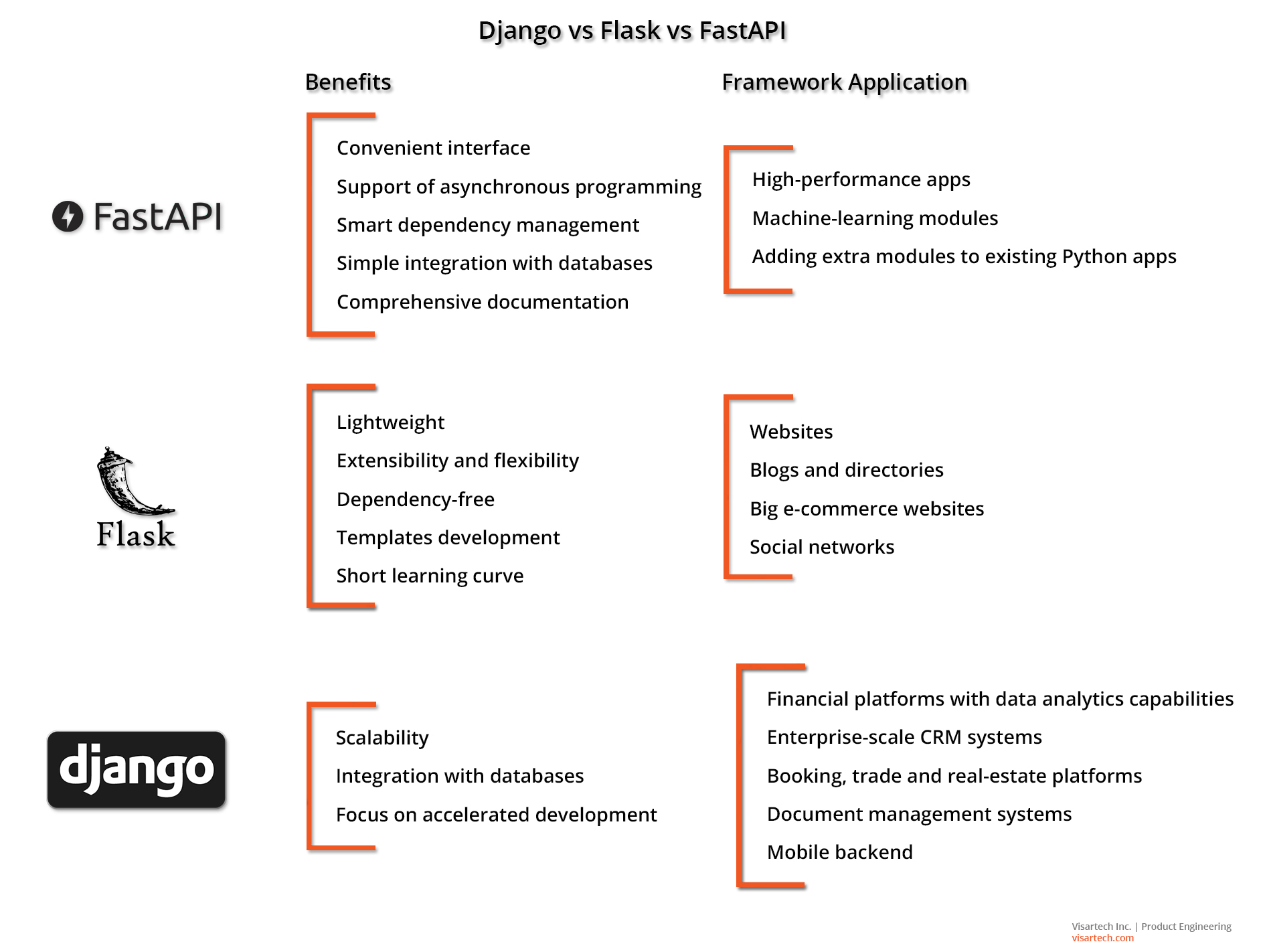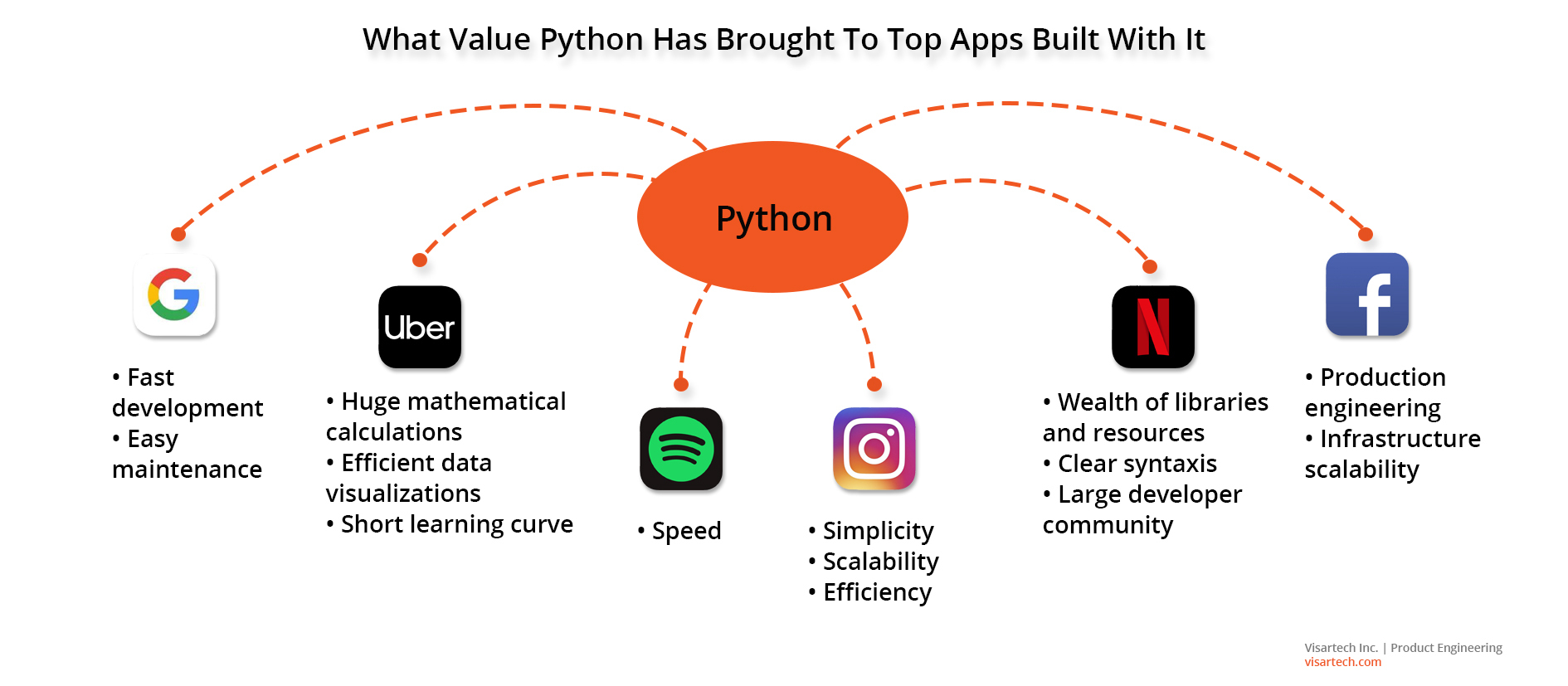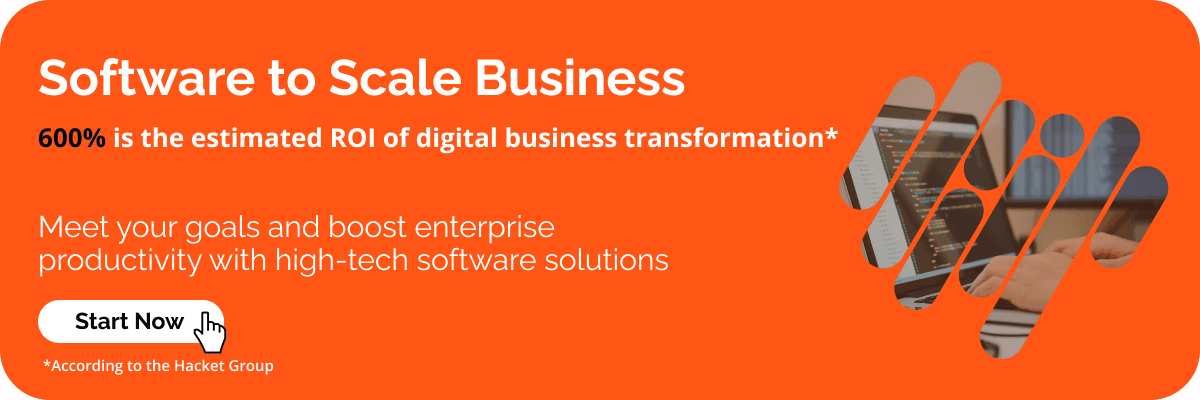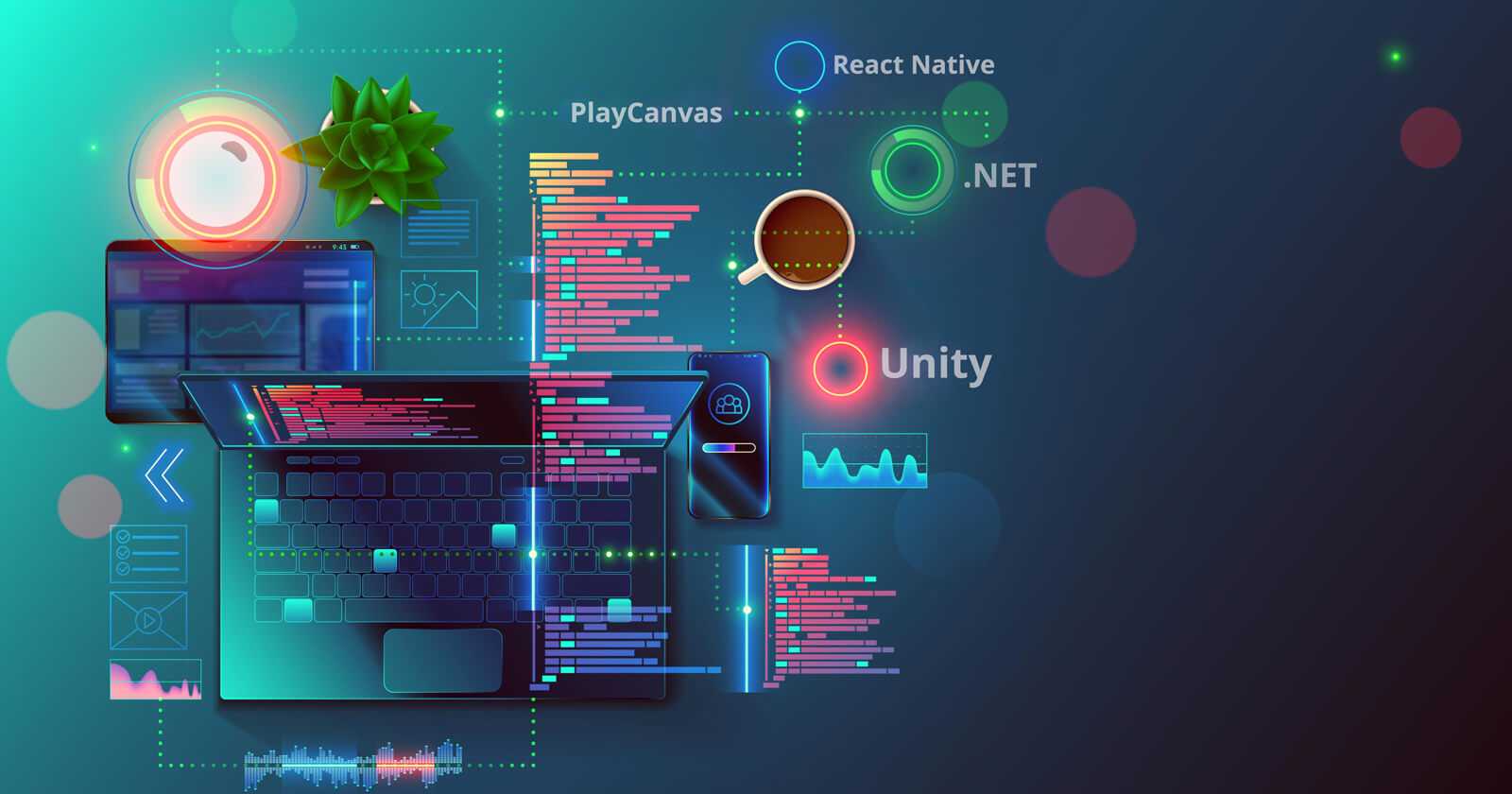One of the world’s biggest code hosting platforms, Github places Python on top of its PYPL Popularity index. This ranking is based on how often people search the Internet for coding tutorials. Obviously, there are reasons why they want to tap into Python app development. Other communities, such as Stack Overflow, are also placing Python on top of their rankings.
In this blog post, we will explore:
- what makes Python so popular along with its well-established frameworks,
- what applications of Python can bring the most value,
- how it can propel your software development efforts.
Finally, find the big names of world-famous software companies utilizing Python for their product development at the end of the article.
What is Python?
On average, the number of languages for programming exceeds 700. Released in the nineties, Python is one of the oldest ones. Yet, today it is winning increasingly wider acceptance. So what makes Python stand out?
Whenever you google a Python description, you’re sure to come across the words ‘high-level’, ‘interpreted’, and ‘multi-purpose’. While the latter is easier to understand, the former terms deserve an extensive explanation.
The term ‘interpreted language’ means that the code gets executed immediately, without the need to compile it into the machine script. High-level means it’s high on the scale of abstraction and may even use the elements of human speech. By comparison, a low-level language is so close to the instruction set architecture of a computer, that it is almost similar to computer commands.
The Python script is more compact and succinct than other coding languages. It has understandable syntaxis and is easy to master, which probably explains the immense popularity of Python tutorials across the web.
Choosing the Optimal Programming Language for Project
Is Python suitable for any product whatsoever? No programming language is universal, but choosing a tech stack wisely, can surely add to the product’s success.
The main aspects to think about, when determining the language for your codebase are as follows:
- Your product type
Different products demand different skills and expertise. If you plan to build an app for a particular platform, you will need specific skill sets. For instance, you will need Objective-C or Swift to build native iOS apps.
Python, however, is almost universal and has a wide range of use cases. We will explore them further in more detail. Its versatility is one of the main reasons why companies choose Python for business project development to power their development efforts.
- The scope and complexity
How large and sophisticated will be your end product, can also dictate your choice of the technology stack. You can leverage PHP if you plan to build a small-size website or web application, while midsize projects may demand expertise in Java and C#. One way or the other, larger projects will include different modules and integrations. So your tech stack will be more versatile. In this regard, Python is the best programming language for large-scale projects, although, not the ones requiring CPU-intensive tasks.
- Scalability
Your product scalability is an important aspect to consider when choosing a programming language. In essence, scalability refers to a product’s capability to handle increasing workloads, as the business grows. If you need a highly scalable solution, choose a programming language that will scale fast.
Python scripts have to undergo interpretation, to become readable to devices at the machine level. It also has a slightly higher latency than most low-level languages.
- Maintainability
As your product evolves, it will need maintenance, support, and updates. So choosing a programming language with a strong support community and knowledge base, is, ultimately, a wise decision. Python has a wide open-source knowledge base and a densely populated community of professionals.
One more aspect to be aware of is the people factor. Do consider the already available expertise of your in-house development team, as well as the access to the development talents. If the coding skill you need is scarce in your area, you may want to reconsider your choice of coding language.
- Security
Security considerations are paramount for most industries, especially, finance and medical services. Different technology stacks will have different security capabilities, so don’t take this aspect off count when choosing a programming language.
Admittedly, Python is not completely free from security vulnerabilities. However, it has the lowest vulnerability index among a number of competitors: C, C++, Ruby, PHP, and Java. Notably, it is the most frequent language used as a weapon for hacker attacks.
Read also: How to Save Money on a Web Project for Businesses
Learn how to select the best tech stack for your web application
For many applications, Python may turn out to be an optimal language. The use of microservice architecture, however, allows integrating modules written in different languages into one project. Especially the one that is meant to be large-scale and complex.
The Pros of Python for Successful App Development & Launch
Released in 1991, Python has been in use for quite a while now. Decades past, companies are increasingly leveraging it for web development.

So what are its advantages for website launch?
- Short learning curve
For programmers who already know C++ or Java, Python is overwhelmingly easy to comprehend.
- Simplicity
It is understandable and intuitive for us, humans. In fact, some experts prefer to call it a scripting language, since it uses scripts translated into machine code. Simplicity is deeply ingrained into its structure. Actually, Python coding principles resemble a Zen manifesto. Fewer lines also make it easier to debug.
- Fast prototype development
In today’s competitive environment, the ability to quickly build a prototype and test a product idea can help companies gain an upper hand. Python is a great choice whenever you need proof of concept.
- Integrations
Python is adaptable, and can easily integrate with other programming languages. Such integrations result in hybrid implementations: Jython, for example, stands for Python + Java, and CPython is a name for the integration of Python and C.
- Excellent for backend tasks
Need to incorporate artificial intelligence (AI) and data analytics into your website? Python can help you integrate these and other technologies into a server-side backend. Its top-notch data visualization capabilities enable programmers to create charts and reports for advanced data representation via a website or a mobile app.
- Asynchronous programming
Python supports asynchronous coding patterns, which makes it especially convenient for developers. Asynchronous patterns prevent an application from appearing blocked when performing a resource-intensive task; users can still navigate a UI while an operation takes place.
- Versatile code libraries, resources, and toolkits
The Python community offers a variety of resources, such as code libraries containing chunks of pre-written code that you can easily integrate into your project. Needless to say, it helps accelerate the development and explains why Python is so immensely popular.
- Great frameworks
Finally, Python has a range of great frameworks that facilitate web development and account for great usability and coding experience.
Below, we will explore popular Python development frameworks in more detail.
Popular Frameworks for Python App Development
The widest range of convenient programming environments is perhaps the most attractive thing about Python development.

There are over 20 frameworks out there, but here we will focus on the most widely used ones: Django, FastAPI, and Flask.
Django
Among different development environments, Django is surely an unmatched favorite. A full-stack framework, great for developing complex applications rich with features, Django provides a lot of ready-made modules for basic app functionality so that developers can focus on building something truly unique.
In a nutshell, reasons for using the Django Python framework include:
- Scalability
With Django, you can build websites and apps capable of scaling on-demand as your business grows, and of processing heavy traffic and workloads.
- Integration with databases
Django works with most of the common databases. It enables developers to pick the most suitable one for a particular project or several databases simultaneously. This feature is not particularly unique, yet, very convenient.
- Focus on accelerated development
Django leverages some of the popular development methodologies, to achieve faster time-to-market.
Interestingly, Django was initially built as a CMS system but later became a full-fledged framework. Apart from web development, companies currently use Python and Django to build:
- financial platforms with data analytics capabilities,
- enterprise-scale CRM systems,
- booking, trade and real-estate platforms,
- document management systems,
- mobile backend.
Flask
Flask is a microservice framework and differs from Django in many aspects. Flask provides Python developers with the basic function set (routing, templating, WSGI compliance, and request handling) while offering modular design for anything else that they may want to add.
Flask has a number of tangible benefits:
- Lightweight
It allows web developers to build a simple working application with just a few lines of code.
- Extensibility and flexibility
It is possible to install and customize a huge variety of extensions to fit your needs.
- Dependency-free
As a microframework, Flask has almost no dependencies on external code libraries. It is very minimalistic and operates faster.
- Templates development
Flask enables web developers to copy UI and use it for multiple pages, including variables, when necessary.
- Short learning curve
This aspect makes it an excellent tool for beginning web developers, although they have to know Python in order to use Flask.
Typically, companies use Flask to build web apps, from small to large ones. Websites, blogs and directories, big e-commerce websites, and social networks can all be created using Flask.
FastAPI
FastAPI is a relatively new Python framework that is currently extending its pool of users and becoming mainstream. It is an asynchronous framework, meaning it is intended for writing concurrent code. FastAPI is also the most recent of Python frameworks, inspired by Django, Flask, and another asynchronous development environment, Sanic.
So what’s making FastAPI so special?
- Convenient interface
FastAPI combines Flask simplicity with relevant suggestions and editor support for easy Python development.
- Support of asynchronous programming
This point reduces latency and increases performance.
- Smart dependency management
FastAPI offers a convenient Dependency Injection method to control dependencies.
- Simple integration with databases
Adding and integrating multiple databases is as easy as in the best-of-breed frameworks.
- Comprehensive documentation
Excellent documentation and tutorials are easy to navigate and learn.
The use case for FastAPI includes high-performance apps, machine-learning modules, or adding extra modules to existing Python apps.
What Type of Apps Can You Build with Python?
As you can see, the list of use cases for Python-powered apps is quite extensive. If you haven’t had a chance to meet the results of Python development, learning exactly what products Python can contribute to may be confusing. Below we are going to spill some light on the subject, so read on.

As of today, app development companies are leveraging Python in areas like:
- Web development
- AI/ML, Data science
- Desktop GUI
- E-commerce apps
- Enterprise applications and ERP systems
- Blockchain
- Testing
- Web parsers
- Chatbots
- Game development
- DevOps, etc.
Read also: How Much Does It Cost To Create an App?
Check the comprehensive guide on app development cost
Python Applications per Industries
The use cases by industry are equally revealing. The business applications for Python continuously extend as software development companies embrace digital transformation. Today, the industries leveraging Python for product development include:
- Finance
Python has been acknowledged as the main programming language for fintech apps and platforms. It’s not just the fintech startups, though. Market incumbents, for example, Bank of America, have taken serious steps to shift from their legacy software and create apps with Python.
- Healthcare
Healthcare providers use Python-driven data analytics and machine learning in predictive diagnostics, reading medical images, patient care management, and personalized medicine.
- Entertainment
Recommendation engines, suggesting movies and songs based on previous choices and preferences are vivid examples of how Python is used in entertainment.
- Retail
Retailers leverage Python for customer behavior analysis, targeted advertising, predictive planning, creating personalized offers and loyalty programs, etc.
- Manufacturing
In manufacturing, Python is used to create custom enterprise applications and ERP systems.
Using Python for MVP Development
For budding startups, fast prototype development can literally become a matter of life and death. That is why entrepreneurs across industries turn to custom Python app development to quickly build and test their MVPs.
Python is a popular choice for MVP development, and app development companies prefer to use the Django framework.
The reasons for Python Django development are obvious:
- Simplicity
Python emphasizes simplicity, which accounts for fast product development.
- Portability
For making a prototype in Python, Django development has yet no rival: its code libraries enable web developers to easily build common features and save valuable time.
- Scalability
Django architects apps in a manner that lets the developers easily scale them when necessary.
Read also: 10 Reasons To Write Tech Specification for a Startup
Why tech documentation is crucial and what happens without it
Ultimately, Python on a Django framework allows you to quickly build powerful apps that will scale as your business expands.
Top Apps Built With Python
Saving the best for last, here’s an overview of the different kinds of applications developed with Python. Some of these names may include your long-term favorites.

Initially, the world-renown image-sharing network was built with Python as a simple website on the Django framework. Surely, since then the company’s tech stack has gotten more complex. Still, Instagram started off as a Python-powered website.
Simplicity is the reason why the Instagram tech team chose Python in the first place. Currently, as the pool of users extends, they are reaping the benefits of its scalability and efficiency.
Spotify
One of the world’s best music apps, Spotify uses Python as its core programming language and is written on asynchronous frameworks. The application’s backend system is powered by Python by 80%, although it includes other interdependent services written in Java or C and C++.
The speed is what the Spotify team loves about Python since it places high importance on time-to-value.
Netflix
This popular Internet TV service with its recommendation engine winning over 33 million subscribers worldwide is also built with Python. Netflix devs are free to pick the optimal tech stack for their tasks, and, notably, they were increasingly choosing Python since 2013.
Netflix devs choose Python over other languages for a variety of reasons. Among them are the wealth of libraries and resources, clear syntaxis, and a large developer community.
Uber
The creators of this ride-sharing service have been initially contemplating Ruby but found Python more suitable for their purposes. The Uber platform performs a lot of mathematical calculations that Python handles better. Also, it works effectively with data visualizations, which is important for Uber.
A short learning curve is one more aspect making it so attractive: amidst the shortage of developers, hiring the ones with working knowledge of Python helps close the staffing gaps.
Being the largest social network, Facebook has an immense impact on the world in general. The company technology stack is a complex mix of interconnected services.
However, according to the Facebook team, Python accounts for 21% of the platform’s code. App developers use it for two purposes:
- production engineering,
- to ensure infrastructure scalability.
Google is now a synonym for Internet search. From the very start, the creators of the world’s top search engine decided to use Python whenever they could to provide fast development and easy maintenance, and C whenever low latency was crucial.
By now, it would be no exaggeration to say that Google is one of the heaviest Python users. Another Google service, the world’s largest video streaming platform Youtube is written almost entirely in Python.
These names speak for themselves. Obviously, apart from the efficient tech stack, these world-famous apps and services have other prerequisites for staying on top of the game, including successful business models. However, it looks like Python could be an important part of their success.
Conclusions
The range of Python business use cases keeps extending. As of today, it is increasingly used in web, app, and enterprise product development. Surely, Python has its limitations, such as a slightly higher latency. Yet, the seamless integrations with other programming languages make it almost universal.
With a robust developer community, rich code libraries and resources, and a number of diverse development frameworks, Python has all it takes to become your instrument of choice for propelling your business forward.
Python app development enables you to accelerate development, create MVPs fast, and test them for acceptance. Moreover, it helps to drive digital transformation with emerging technologies, and build reliable and scalable future-ready software solutions.
Looking for the best programming language for your project? Contact us now for a free consultation!




